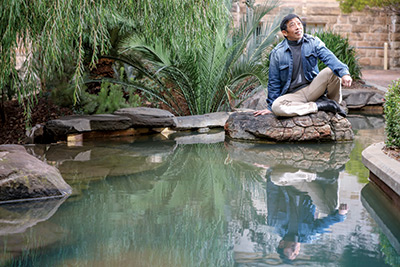From peasant to professor

Professor Mobo Gao To understand the power of education to change lives you need to talk to Mobo Gao, professor of Chinese and director of the Confucius Institute at the University.
Professor Mobo Chang Fan Gao was born in the farming village of Gao in China’s Jiangxi Province, where he lived a peasant’s life until selected for university at the age of 21. After a degree in English teaching, in 1977 the Chinese government sponsored him to do a Masters degree in the United Kingdom. Gao then did a PhD at the University of Essex on Noam Chomsky’s linguistics, as a self-sponsored student.
He returned to China to teach English for five years but, disillusioned with linguistics and anxious to understand what had happened to his homeland since the Communist Revolution, he jumped at the offer of a teaching job at Griffith University in Australia. From there he moved to the University of Tasmania before arriving at Adelaide in 2008.
From farm labourer to internationally regarded scholar – with four books and dozens of papers and articles to his name – is impressive in any circumstances. But starting in China as it began to engage with the West surely makes Professor Gao’s achievements especially so.
His background also gives him a firsthand experience of the subtleties of Chinese politics and society, which make him uniquely suited to leading the 成人大片’s Confucius Institute. Yes, he says, Adelaide’s institute, like all the others around the world, receive funding from the Chinese Government and he does not doubt Beijing sees them as a way of projecting “soft power”—of presenting a positive image of China to the world. But unlike European equivalents, staffed by government officials, he works directly for the University.
In any case it would be a committed cadre who tried to give instructions to Professor Gao: “I don’t care what the Chinese authorities want, I do what is right for the University. But while it would be up to me to resist any interference, none has ever occurred.”
Confucius Institutes have different focuses, as suits institutions: RMIT in Melbourne is interested in Chinese medicine, Griffith University’s looks at tourism and Adelaide’s is shaped by Professor Gao’s ambition to make it a forum for exchanging ideas on core issues of concern between Australia and China. “The first major lecture we held was on human rights in China,” he says. “And we have also held talks on Tibet and democracy.”
The Institute has a strong cultural program that has included exhibiting traditional works of calligraphy at the Art Gallery of SA to inviting a Chinese electro-pop band for some concerts in Adelaide. There is also a concerted effort to increase awareness of China among business and community leaders.
“South Australia seemed more hesitant than other states to see the potential for business opportunities and exchanges of experts and ideas but the pace has picked up now with a major State Government trade delegation,” Professor Gao says. “China is also the University’s leading partner in science and technology research collaborations.”
The Confucius Institute offers a range of services for industry looking to do business in China, including tailored language tuition, classes on protocol and customs expected in China and briefings on ever changing economic conditions.
“It also is a resource for schools teaching Chinese across the state,” he says. This is a role set to expand due to the State Government picking up Professor Gao’s idea for a dual-language Chinese-English school. This initiative could have enormous potential in increasing the number of students who do not have a Chinese background studying the language at the University.
In addition to his commitment to making the Institute a real resource for South Australia, and a conduit of ideas with China, Professor Gao also brings to it is his insight into a country transformed across his lifetime.
He explains through a history of his village, entitled Gao Village: A Portrait of Rural Life in Modern China, that the Cultural Revolution was “a golden age” for ordinary people in terms of education and health care. “It was still a Spartan life but vastly better,” he says. Professor Gao expanded further on this theme in his 2008 work, The Battle for China’s Past: Mao and the Cultural Revolution.
However, he also acknowledges the extraordinary impact of the changes adopted by Mao’s successors. “China industrialised because of a planned economy but when you get to a certain stage you needpersonal initiative.”
The transformation of his village tells the tale: “When I left the village, it had no electricity and people could not even afford bicycles.” Now he says, thanks to migrant workers sending money home, he has been picked up at the airport by a five-car convoy when he returns to visit. “Houses there are better than mine in Adelaide, the material transformation is unprecedented,” he says.
Nor is oppression the price of prosperity. Professor Gao dismisses generalisations that dissent is are suppressed by the Chinese government.
“It’s too rich and diverse for the Communist Party to control. In China, people can say anything they want as long as they don’t organise to threaten the state.”
|



